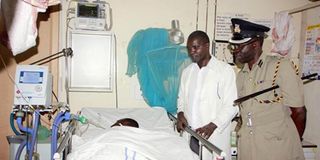How equipping county hospitals is saving patients time and money

Henry Ondieki, a nursing officer at the Jaramogi Oginga Odinga Teaching and Referral Hospital, at the hospital’s ICU briefing Nyanza traffic boss Joshua Omukata about the condition of Kapsabet Boys High School student Bernard Odero, who was involved in an accident on May 20, 2015. PHOTO | TONNY OMONDI |
What you need to know:
- Growth and expansion of health facilities has partly been attributed to devolution of sector.
- Jaramogi Oginga Odinga hospital now has 11 dialysis machines, as well as other equipment.
Terminally ill patients in Kisumu and Bomet counties can now breathe a sigh of relief thanks to efforts being made to equip public hospitals.
The patients who used to travel all the way to Kenyatta National Hospital (KNH) in Nairobi for treatment can now get the same services locally.
They are grateful to the devolution of the health sector which they say has seen many public hospitals expanded and better equipped.
The patients who talked to the Nation, including those suffering from cancer and kidney ailments as well as those needing specialised treatment, say getting such services locally has eased their financial burden and saved them time.
One of the hospitals that has benefited from devolution include Jaramogi Oginga Odinga Teaching and Referral Hospital (JOOTRH) which now has a fully equipped Intensive Care Unit.
Besides this, Kisumu County government has also bought five dialysis machines while well wishers donated six more. There are several ambulances on stand-by and several scan machines have also been bought. There is also fully equipped theatre.
The cost of one machine ranges between Sh3million and Sh15million, according to Dr Philip Raburu, the hospital’s deputy administrator.
We meet a boda boda rider Mr Ezra Onyago at the hospital. He was involved in an accident in Kisumu. The accident almost cost him his life
“It involved a truck which knocked a salon car that later hit me. I am told I was unconscious for days. Doctors said I had an internal brain injury,” said Mr Onyango.
“But I got all the services I needed in Kisumu, including a CT scan and a very delicate surgery that I had to go through and it was successful.”
A LOT CHEAPER
Mr Onyango said even though he still visits the hospital for check-ups, it is a lot cheaper than would have been the case if he was being treated in Nairobi.
Mr Valentine Odongo, a kidney patient at the hospital, said he no longer travels to Nairobi two times a week to undergo dialysis.
“It was very expensive given that I did have a health insurance. But not any more as the JOOTRH is offering the same services,” he said.
The former accountant at a firm in South Sudan says he would pay Sh5,000 per session at KNH and this figure did not include other expenses including travel costs and meals.
“I would spend up to Sh30,000 per week,” a jovial Odongo told the Nation from his hospital bed. “Each session here now costs me Sh4,000 and I use less than Sh100 to get here.”
Most kidney patients in the renal unit during our visits were from neighbouring Migori, Kakamega, Homa Bay and Siaya counties.
Ms Magaret Aran, a nurse in charge of the renal unit said they book in patients twice a week — on Mondays and Thursdays.
In Bomet, such patients are treated at Longisa District Hospital. Mr James Kipruno, a cancer patient, says he can easily cross over to Kisumu when there is a problem with machines at Longisa.
“Diagnosis of my condition was done in Kisumu and I do not have to travel to Nairobi for treatment. This has also made management of my condition a lot easier,” he says.
Some of the governors who had opposed the medical equipment leased by the national government are now softening their positions in a bid to give residents better medical care.






